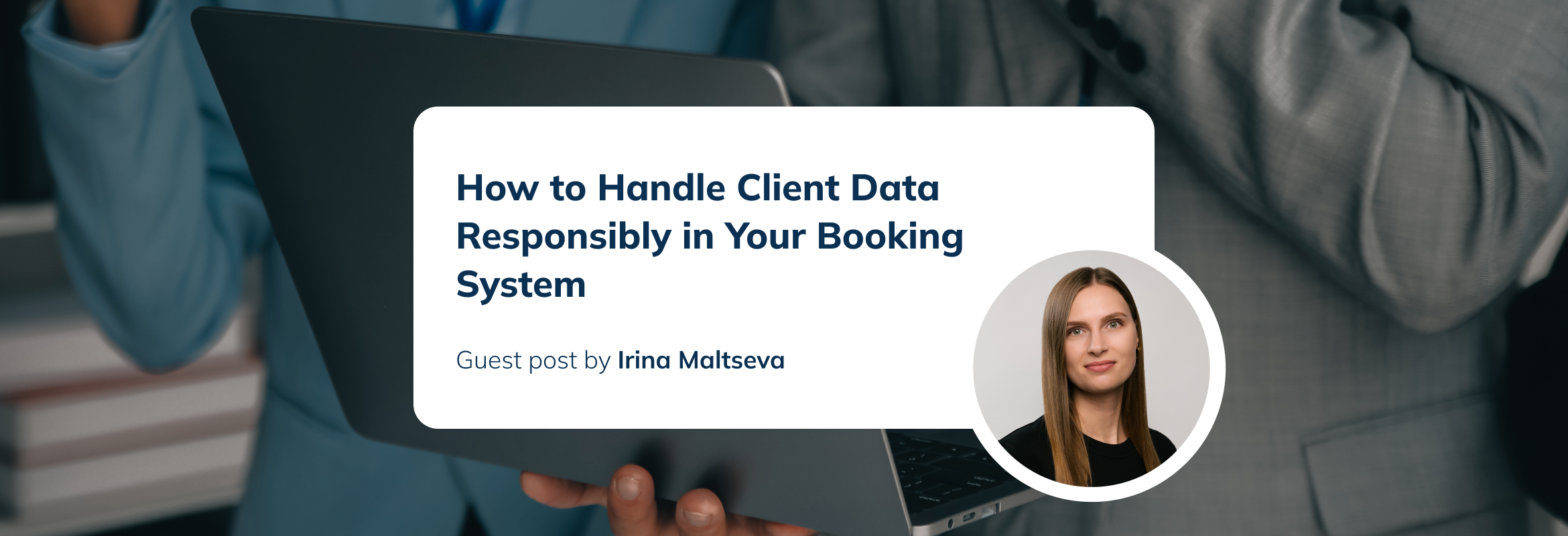How to Handle Client Data Responsibly in Your Booking System

This post is also available in:
![]()
![]()
![]()
![]()
Whether you operate a hotel, restaurant, doctor’s office or any other service that takes bookings, your booking system likely contains sensitive client data like names, contact details, health information, and more.
As a business owner, you have an ethical and legal responsibility to handle this client data properly. Mishandling client data can destroy trust, harm your reputation, and leave you open to heavy fines or lawsuits if you violate regulations like GDPR and HIPAA.
The good news? With the right security measures and data handling practices, you can help safeguard client information, comply with data protection laws, and build lasting trust through your booking system. Here, we explore practical strategies to handle client data responsibly.
Let’s start with a quick overview of why responsible data management matters so much in booking systems today.
Understanding Client Data Management in Booking Systems
Client data is the lifeblood of any booking system. Details like names, contact information, appointments requested, and health/medical data (sometimes) allow you to identify clients, connect with them and provide your services efficiently.
But with this client data comes great responsibility. You are ethically and legally obligated to handle it properly through measures like:
- Secure data storage and transfer
- Access controls
- Data encryption
- Transparency about data usage
- Protections against unauthorized access, leaks, and breaches
Get these things right, and clients will trust you. Mess them up, and you could face reputational damage, lawsuits, and steep fines for violating regulations designed to protect client privacy and data rights.
Below are three core principles to follow when managing client data in a booking system or any other context:
1. Limit data collection to what’s necessary
Only gather client details essential for your booking and service delivery needs. Don’t collect extraneous data “just because.”
Example: A hair salon only needs a client’s name, contact details, and appointment specifics. Medical history is not required.
2. Restrict internal access to client data
Give access only to staff who need it for their job duties. Don’t allow company-wide access.
Example: Only customer service staff handling bookings require access to the booking system. Marketing staff analyzing sales funnels do not.
3. Be transparent about how you use and secure data
Disclose to clients how their data will be used and protected, and make sure you obtain their consent to use it how you intend to.
Example: A client signs an informed consent form detailing data usage practices before entering their information into the booking system.
Adhering to these principles will help form the foundation of a responsible, trustworthy approach to client data management. Next, let’s look at specific regulations you’ll need to comply with.
Ensuring Compliance with Data Protection Regulations
Depending on your industry, location, and the types of client data you collect, you’ll likely need to comply with certain regulations. The main ones include the GDPR, HIPAA, and other global data protection laws.
GDPR
The EU’s General Data Protection Regulation imposes strict requirements for handling any personal data of EU citizens, including:
- Lawful basis for processing data: You must have consent or other valid reasons defined by GDPR for gathering and using client information.
- Limited data gathering: Don’t collect any unnecessary data beyond what’s needed for your bookings.
- Data security: You must protect client data with encryption, anonymization, and other safeguards.
- Breach notification: Any breaches must be reported to regulators and clients within 72 hours of discovery.
- Right to be forgotten: Clients can request their data be deleted.
Failing to meet GDPR can get you fined up to €20 million or 4% of global revenue.
HIPAA
The US Health Insurance Portability and Accountability Act governs patient health data privacy. If your bookings involve medical/health information, HIPAA rules apply, including:
- Data encryption: Encrypt all health data end-to-end.
- Access controls: Strictly limit and monitor internal access to client health records.
- Business associate agreements: Have binding agreements with any third parties accessing health data.
- Breach notification: Report health data breaches to HHS and clients affected.
Global data protection laws
Dozens of countries have enacted data privacy laws similar to GDPR and HIPAA. Research any regulations specific to locations where you operate. Some examples:
- Canada’s PIPEDA
- Australia Privacy Act
- Brazil’s LGPD
- South Africa POPI Act
Fines, lawsuits, and reputation damage can occur globally for data mishandling. Regularly review compliance needs.
“Proper data management and handling often seems of secondary importance, however, leaks or inefficiencies in governance practices lead to enormous operational and financial risks. Every business should implement technological and cultural practices that ensure client data is managed securely and in accordance with existing laws and regulations”, says Karolis Toleikis, Chief Executive Officer at IPRoyal.
Next, let’s explore hands-on strategies to lock down security for client data in your booking system.
Implementing Robust Security Measures for Client Data
Technical safeguards are essential for protecting client data. Focus on three key areas:
1. Preventing unauthorized access
- Use secure passwords: Enforce strong passwords and multi-factor authentication for all user accounts accessing the booking system or client data.
- Be wary of public WiFi: Don’t allow staff to access the booking system on public networks. Restrict it to your private network.
- Limit access rights: Give staff minimal access to only the data needed for their duties through role-based permissions.
- Employ data leakage prevention: Tools like firewalls, intrusion detection, and data loss prevention software help prevent unauthorized access or data extraction.
- Education about phishing risks: Train staff to identify and avoid email phishing attempts aiming to steal login credentials.
2. Safeguarding against data breaches
- Encrypt stored and transmitted data: Prevent unauthorized access to at-rest and in-transit data through encryption.
- Anonymize data: Remove personally identifiable information where possible in internal data sets.
- Perform security audits: Routinely audit your software, booking system and internal networks for potential vulnerabilities.
- Update software regularly: Apply latest security patches to booking system and related software to prevent exploitation of known bugs.
- Limit third-party access: Carefully vet any external tools or providers accessing your booking data. Have air-tight business associate agreements.
3. Secure data transfer
- Use HTTPS: Websites and APIs related to bookings should use SSL/TLS encryption.
- Avoid public WiFi: Never transmit unencrypted booking data over public networks. Always use VPN, doesn’t matter it’s free or paid.
- Encrypt backups: Backups containing client data should be encrypted both in transit and at rest.
- Secure emails: Encrypt emails exchanged with clients containing sensitive information.
- Secure VoIP: Consider integrating a VoIP phone service that provides end-to-end encryption for voice communications, ensuring all client interactions are securely protected.
With the right combination of access controls, network security, encryption and auditing, you can help shield client data from compromise.
But security is only half the story. Let’s examine the ethical side of client data handling.
Ethical Considerations in Handling Client Data
Beyond just complying with regulations, you have an ethical obligation to handle client data in a way that respects privacy, consent, and transparency.
Here are some best practices to consider:
Build client trust through ethical data practices
- Be open about your data practices: Clearly explain to clients how you’ll use and protect their information.
- Limit data use to only authorized purposes: Don’t exploit client data for undisclosed reasons like selling to third parties.
- Provide privacy options: Allow clients to opt out of any non-essential data collection.
- Honor deletion requests promptly: Remove client data if they ask you to delete it.
Uphold consent and transparency in data collection
- Obtain clear, documented consent: Get written or digital consent before collecting client information.
- Allow clients to update data or preferences: Provide easy ways for them to modify consent.
- Disclose any sharing with third parties: Notify clients if vendors ever access their data.
- Periodically refresh consent: Don’t assume one-time consent lasts forever. Seek consent again after a reasonable period.
Maintain integrity in data handling
- Be honest in communications: Never deceive clients about how data is used.
- Have human oversight over AI-driven processes impacting clients: Don’t rely solely on algorithms when dealing with client data.
- Rectify mistakes: If you become aware of errors or misuse of client data, address issues urgently.
- Destroy data promptly when asked: Honor client requests for deletion in a timely manner.
Adhering to strong ethical principles builds goodwill and trust. Next, let’s look at privacy-focused best practices.
Best Practices in Data Privacy for Booking Platforms
Maintaining robust privacy measures tailored to booking platforms helps safeguard client confidentiality:
Ensure confidentiality in online bookings
- Use HTTPS on booking websites: Encrypt all web traffic to prevent snooping.
- Mask sensitive fields: Partially mask entries like credit card numbers and SSNs.
- Anonymize public data: Scrub PII from any aggregated datasets.
- Support anonymous bookings: Allow clients to book without providing unnecessary personal details.
Implement thoughtful access controls
- Restrict staff access with roles: Give customer service only the minimum data required to handle bookings.
- Limit third-party access: Carefully control and audit external tools accessing booking data through strong contracts.
- Enable strong multifactor authentication: Add extra login protections like biometrics, security keys, and passwords.
Establish appropriate data retention policies
- Delete data promptly when required: Have processes to remove data upon client request or when consent expires reliably.
- Anonymize past data not needed: Scrub identifying details from any archived booking data no longer required.
- Shorten retention periods: Avoid keeping data beyond the minimum periods required for legal or operational needs.
With these strategies, you can operate an above-board booking platform that clients trust. But what happens if a breach does occur? Let’s discuss response plans.
Strategies for Data Breach Prevention and Response
Despite your best efforts, data breaches can still happen. Implementing prevention and response strategies is key:
Identify and reduce booking system vulnerabilities
- Perform penetration testing: Use ethical hackers to probe your booking systems for weaknesses.
- Learn from past breaches: Study other companies’ breach post-mortems and avoid their mistakes.
- Monitor systems with threat intelligence: Use threat intel feeds to detect emerging hacking threats aimed at booking platforms.
- Work with security vendors: Reputable vendors can help strengthen defenses and monitor for threats.
- Deploy tailored safeguards: Utilize measures such as firewalls, intrusion detection systems, and protection against vulnerabilities from tools like preview dialer software.
Take prompt action if a breach occurs
- Assess the impact: Determine what data was compromised and identify affected clients.
- Meet legal obligations: Notify regulators and clients per GDPR, HIPAA, or other regulations within 72 hours.
- Offer remedies: Provide credit monitoring, reimburse fraud losses, and other steps to assist affected clients.
- Determine root causes: Conduct a forensic investigation to figure out what vulnerabilities led to the breach.
- Update systems: Use findings to patch security gaps and strengthen defenses against similar attacks happening again.
Regularly audit and update security protocols
- Conduct scheduled audits: Continuously test security measures with automated scans, ethical hacking exercises, and audits.
- Reassess risks periodically: Your risk profile can change over time. Adapt security accordingly.
- Retrain staff regularly: Refresh security and privacy training every 6-12 months as threats evolve.
- Review protocols annually: Update policies, consent forms, and contracts to meet changing regulations and close gaps.
By taking a proactive stance, you can help protect client data against evolving threats. But prevention isn’t just about technology – it’s also about people. Let’s explore how to build an organizational culture focused on data protection.
Building a Culture of Data Security Awareness
Technical tools are only part of the equation. Your staff’s security knowledge and habits play a huge role in safeguarding client data:
Provide ongoing training in data protection and compliance
- Start with basics: Ensure everyone understands core concepts like encryption, access control, and need-to-know access.
- Go in-depth for relevant roles: Database admins, developers, and customer service reps interacting with the booking system require more extensive training tailored to their duties.
- Include compliance training: Educate staff on essential regulations like GDPR and HIPAA that apply to your booking data.
- Make training engaging: Interactive courses with role-playing scenarios are ideal. Refresh regularly. Some platforms for employee management have great training and feedback features. You can use them in the training process.
Cultivate a proactive approach to data security
- Encourage raising concerns: Create an open culture where staff feel comfortable surfacing potential vulnerabilities or privacy issues without fear of retaliation.
- Empower security leadership: Have a designated Chief Security Officer to develop strategy and coordinate security efforts across teams like IT, customer service, and HR.
- Incentivize identifying issues: Consider rewarding staff who proactively discover and report security problems.
- Learn from incidents: Leverage past data breaches or near misses as opportunities to improve rather than playing the blame game.
Help clients understand your data safety measures
- Communicate transparently: Explain to clients upfront how you protect and handle their data.
- Simplify privacy policies: Make privacy notices readable and understandable to ordinary people.
- Provide data access: Allow clients to easily access, export or delete their data upon request.
- Welcome feedback: Create channels for clients to ask questions and raise any concerns.
You can earn enduring client trust and confidence with a culture centered on security and transparency.
Setting a New Standard in Client Data Handling
Responsible client data management presents challenges, but the rewards are immense: improved client trust, reduced risk, and reinforced reputation as an ethical leader in your industry.
By following strategies around security, compliance, ethics, and organizational culture covered in this guide, you can become not just compliant but an exemplar for booking services in safeguarding client data.
The most successful companies view data responsibility not as a burden but as an opportunity to continually better themselves. Regularly self-audit, refresh your practices, and invest in staying on the cutting edge of data protection. Make it a competitive advantage.
When clients provide you with their most sensitive information, they are putting their trust in your hands. Uphold that hard-earned trust through a commitment to responsible data stewardship at all levels of your organization.
Your clients – and your business – will thank you.
Author Bio:
Irina Maltseva is a Growth Lead at Aura, a Founder at ONSAAS, and SEO Advisor. For the last eight years, she has been helping SaaS companies to grow their revenue with inbound marketing.



Comments
0 commentsNo comments yet